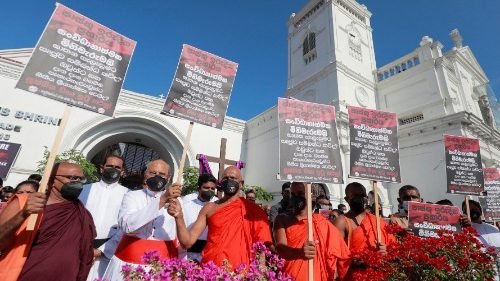Cardinal Malcolm Ranjith says the government of President Gotabaya Rajapaksa promised swift action to uncover the truth behind the terrorist bomb attacks but after it came to power, its response has been faulty.
By Vatican News staff writer
A prominent Catholic Church leader of Sri Lanka on Friday expressed the Church’s disappointment with the government probe into the 2019 Easter Sunday suicide bomb attacks on churches and hotels in the country. Cardinal Malcolm Ranjit of Colombo said that 25 people charged last week in connection with the April 21 bomb attacks that killed 269 people could be “smaller fish,” and accused the government of still not taking steps to identify the big fish, still at large.
Protest against government inaction
Last month, the cardinal sent a 20-page letter, to President Rajapaksa over allegations that officials in state intelligence agencies knew and met with the attackers. Signed by 8 bishops, including Cardinal Ranjith and some Catholic priests, the letter also demanded action against former President Maithripala Sirisena and former Prime Minister Ranil Wickremesinghe for their soft approach towards Islamic terrorism. The signatories warned that Catholics would be obliged to agitate for action through alternative ways if their demands were not met. Cardinal Ranjith rejected Rajapaksa’s action as inadequate, saying he has not responded to his queries and issues he has raised.
The cardinal urged the country’s Catholics to express their dissatisfaction publicly this week. “Raise a black flag on August 21 in front of your homes, institutions and market places as a strong symbol of the silent protest,” he said at a press conference on August 13.
Faulty process
The 73-year-old cardinal said he was not satisfied with the legal action currently taken against suspects. “We can never believe that the truth will come out through this ongoing process. We do not accept the appointment of a committee consisting of members of one political party above the recommendations of the report of the Presidential Commission.” He said that the Presidential Commission of Inquiry (PCoI) should involve all political parties in order to make the process convincing. He said, “The letter did not mention any action the government would take and a proper investigation into the serious issues we raised about the attacks.”
On Tuesday, the attorney general filed 23,270 charges against 25 people under the country’s anti-terrorism law. The charges include conspiring to murder, aiding and abetting, collecting arms and ammunition and attempted murder. The attorney general also asked the chief justice to appoint a special three-member high court bench to hear the cases speedily.
“We don’t want to say the 25 persons are innocent but we have a question whether this is an attempt to net the smaller fish and let the sharks go.” Cardinal Ranjith said.
Intelligence-terrorism nexus
Two local Muslim groups that had pledged allegiance to the Islamic State group were blamed for six coordinated suicide bomb attacks that occurred almost simultaneously on Easter Sunday of 2019. It is not known if the groups had actual links to the Islamic State.
The blasts targeted three churches and three hotels. Of the 3 churches bombed, 2 belonged to the Archdiocese of Colombo – St. Anthony’s Shrine, Kochchikade and St Sebastian’s Catholic Church in Katuwapitiya, Negombo city. The evangelical Zion Church in Batticaloa, eastern Sri Lanka was the third church targeted. Most of the Easter Sunday casualties occurred at St. Sebastian’s Church, with 113 killed. Another attacker who entered a fourth hotel left without setting off his bomb and later committed suicide by detonating his explosives at a different location. Churchgoers and many foreign tourists having breakfast in their hotels were among those killed. About 500 people were wounded.
Cardinal Ranjith had previously said that Indian intelligence agencies had passed detailed information about the attack, including the date, but the Sri Lankan military did not take any action to prevent the massacre. He also alleged that the PCoI report and other information he received have confirmed that a Sri Lankan military intelligence officer, referred to with the codename ‘Sonic-Sonic’, through a local agent and an unspecified person in Indonesia had forced the terrorist group ISIS to claim responsibility for the Easter Sunday attacks. He complained that the link between the military intelligence and suicide bombers that was revealed during the PCoI has not been investigated by the government, keeping it a secret so far.
False promises for political gains
In a press statement posted on the website of the Archdiocese of Colombo, Cardinal Ranjith said the present government “took political advantage of the Easter Sunday attack and promised to reveal within a month those who carried out the attack”. He said, “It is clear from this procedure that after such a long time the government has no interest in finding out the truth about the attack and they are going to cover it up and wash their hands.” He said the country is still insecure and attacks like those of Easter Sunday could take place any time.
“The real killers must be identified and the country must know the truth. Politicians do not want to end this culture of killing. Extremism is beneficial to them and they continue their selfish journey through the tears of human suffering,” Cardinal Ranjith added.



